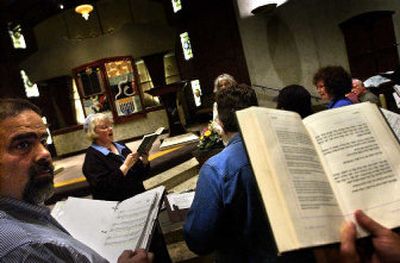Cantors speak to tradition

At sunset, ancient Hebrew melodies will come to life at Temple Beth Shalom.
They’ll be revived by Barbara Slader, the temple’s cantor during the High Holy Days, the most sacred time of year for Jews all over the world.
Through song, she becomes the messenger of prayer – leading the congregation as they give glory to God. In a powerful, lilting soprano, Slader often sings alone, expressing the congregation’s humility, repentance, gratitude, hope and joy.
Singing at High Holy Days can be an overwhelming task – one that presents not only musical challenges for Slader, but also tests her physical and spiritual stamina.
The numerous High Holy Day services begin at sundown tonight with Rosh Hashanah, the Jewish New Year. Slader will sing this evening then return to the bimah – the podium for leading services – on Saturday and Sunday for more worship. Eight days later on Kol Nidre, the evening of Yom Kippur, or the Day of Atonement, she’ll chant for at least two hours and then come back the next day for the four-hour service.
“It’s an awesome responsibility,” said Slader, a Portland resident who travels to Spokane each year to sing with the area’s largest Jewish congregation.
Like rabbis, cantors aren’t necessary to Jewish worship. Members of Temple Beth Shalom, however, say they help enhance the spiritual and emotional experience, particularly during the High Holy Days – a time when all Jews want to honor tradition.
“Music speaks to our soul,” said Dr. Berdine Bender, the choir director and longtime member of Temple Beth Shalom. “It puts you in a special place and allows you to have a conversation with God in a much more spiritual way. … Cantors add so much to the beauty of the service.”
Of Spokane’s three Jewish congregations, Temple Beth Shalom is the only one with an invested or certified cantor. Ner Tamid, a Reform congregation, has neither a rabbi nor cantor but its president, Gary Singer, involves everyone in the readings and music. Susan Windham, a notable soprano in the area and a member of Congregation Beth Haverim, sings most of the music during High Holy Days but she doesn’t consider herself a cantor. Instead, she’s known among her congregation as a “cantorial soloist.”
“It’s a mystical experience,” said Windham. “I am so humbled for this opportunity to be a vessel for this music, for something so ancient and at the same time eternal.”
She hopes to someday explore the possibility of becoming a cantor or “hazan,” a process that can take years of study.
In the olden days, Jews who wished to sing the liturgy learned the music by serving as apprentices to experienced cantors. After World War II, each of U.S. Judaism’s three major branches established cantorial schools in New York where students not only learn traditional music but also Jewish history, liturgy and Talmud. Women weren’t allowed to be cantors until the 1960s, and they still can’t in Orthodox synagogues, but females now outnumber males training to be cantors.
Like rabbis, cantors are clergy who can officiate at weddings, funerals and baby namings. They also must undergo years of training to receive certification. Slader, for instance, spent five years on a supervised, self-study program through New York’s Hebrew Union College.
While some congregations are content to have a song leader during the High Holy Days, others desire cantors who have an intimate knowledge of ancient Jewish melodies, said Slader. And while folk, pop and movie music have been used in some synagogues, most Jews want to keep Rosh Hashanah and Yom Kippur as traditional as possible.
“It’s a point in the year where everyone becomes conservative,” she said. “They want it the old way. They have a strong connection to the generations before them.”
Bender, who’s 52, said the music during High Holy Days always brings her back to her childhood. “It brings back a flood of memories and puts me in a spiritual place.”
Even Jews who are unaffiliated with a congregation usually come to the services. At Rosh Hashanah and Yom Kippur, at least 500 people fill the sanctuary at Temple Beth Shalom.
During this emotional time, Slader looks out to the congregation and sends her awareness around the room while remaining focused on the music, she said. And because she sees herself as a conduit or an empty vessel, she never gets nervous singing in front of such a large crowd.
“The responsibility of the hazan is to find that spark of good in each person and to send his awareness around the room and lift them on the wings of song,” she said, quoting from the teachings of the late Hasidic master, Rabbi Nachman of Breslov. “I feel honored to be entrusted with this responsibility.”
A musician since childhood who played guitar and composed songs, the 58-year-old Slader never had dreams of becoming an entertainer. It wasn’t until later in her life, after she had worked in a synagogue for 15 years, that she discovered her spiritual path.
“I found a reason to sing,” said Slader, whose many duties include teaching weekly Torah study classes in Portland, leading the Jewish community chorus, teaching students how to chant Scripture and officiating at weddings and funerals. “Music brings people closer to each other and closer to God.”